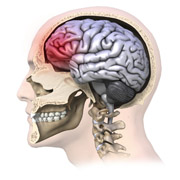Research and Innovation, UNL Office of

Center for Brain, Biology, and Behavior: Faculty Publications
Document Type
Article
Date of this Version
2016
Citation
PLoS ONE 11(6): e0156859.
Abstract
Background Anterior cingulate cortex (ACC) and striatum are part of the emotional neural circuitry implicated in major depressive disorder (MDD). Music is often used for emotion regulation, and pleasurable music listening activates the dopaminergic system in the brain, including the ACC. The present study uses functional MRI (fMRI) and an emotional nonmusical and musical stimuli paradigm to examine how neural processing of emotionally provocative auditory stimuli is altered within the ACC and striatum in depression.
Method Nineteen MDD and 20 never-depressed (ND) control participants listened to standardized positive and negative emotional musical and nonmusical stimuli during fMRI scanning and gave subjective ratings of valence and arousal following scanning.
Results ND participants exhibited greater activation to positive versus negative stimuli in ventral ACC. When compared with ND participants, MDD participants showed a different pattern of activation in ACC. In the rostral part of the ACC, ND participants showed greater activation for positive information, while MDD participants showed greater activation to negative information. In dorsal ACC, the pattern of activation distinguished between the types of stimuli, with ND participants showing greater activation to music compared to nonmusical stimuli, while MDD participants showed greater activation to nonmusical stimuli, with the greatest response to negative nonmusical stimuli. No group differences were found in striatum.
Conclusions These results suggest that people with depression may process emotional auditory stimuli differently based on both the type of stimulation and the emotional content of that stimulation. This raises the possibility that music may be useful in retraining ACC function, potentially leading to more effective and targeted treatments.
Included in
Behavior and Behavior Mechanisms Commons, Nervous System Commons, Other Analytical, Diagnostic and Therapeutic Techniques and Equipment Commons, Other Neuroscience and Neurobiology Commons, Other Psychiatry and Psychology Commons, Rehabilitation and Therapy Commons, Sports Sciences Commons


Comments
© 2016 Lepping et al.
Open access
doi:10.1371/journal.pone.0156859